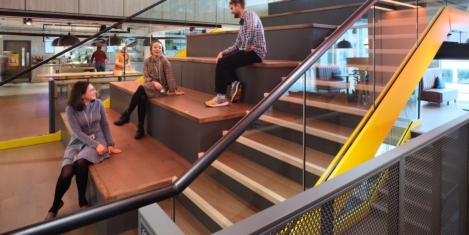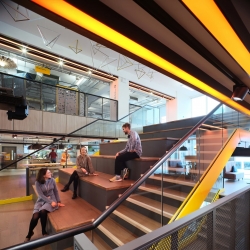November 4, 2022
Responsible capitalism, and space as a service will shape real estate industry over next 20 years
 Europe’s real estate leaders have set out a long-term vision for the industry. In this scenario the most successful firms have adopted ‘responsible capitalism,’ the user is the centre of attention, the cycle of demolition and development has been broken, mixed-use is the norm and multi-disciplinary and in-house teams deliver space as a service across a range of sectors. Emerging Trends in Real Estate Europe 2023, the twentieth annual survey of European real estate sector leaders’ expectations by the Urban Land Institute (ULI) and PwC, has looked beyond the year ahead at the trends shaping the industry over the next two decades. This report captures the views of over 900 sector leaders from across Europe. (more…)
Europe’s real estate leaders have set out a long-term vision for the industry. In this scenario the most successful firms have adopted ‘responsible capitalism,’ the user is the centre of attention, the cycle of demolition and development has been broken, mixed-use is the norm and multi-disciplinary and in-house teams deliver space as a service across a range of sectors. Emerging Trends in Real Estate Europe 2023, the twentieth annual survey of European real estate sector leaders’ expectations by the Urban Land Institute (ULI) and PwC, has looked beyond the year ahead at the trends shaping the industry over the next two decades. This report captures the views of over 900 sector leaders from across Europe. (more…)







 Six workplaces across the North of England and Northern Ireland have been recognised at the annual British Council for Offices (BCO) Regional Awards today. The Northern BCO Awards dinner returned in-person to the Kimpton Clocktower in Manchester, recognising the North’s highest quality developments and setting the standard for excellence in the office sector across the UK.
Six workplaces across the North of England and Northern Ireland have been recognised at the annual British Council for Offices (BCO) Regional Awards today. The Northern BCO Awards dinner returned in-person to the Kimpton Clocktower in Manchester, recognising the North’s highest quality developments and setting the standard for excellence in the office sector across the UK. 




 According to
According to 
 Just 41 percent of UK organisations are on track to meet the Government’s target for net zero carbon emissions by 2050, according to new research released by Dr Chris Brauer,
Just 41 percent of UK organisations are on track to meet the Government’s target for net zero carbon emissions by 2050, according to new research released by Dr Chris Brauer, 
 Increasing pressure from investors, customers and employees are causing CEOs to focus their businesses on purpose, resilience and long-term sustainability, according to a new report from the Reward & Employee Benefits Association (
Increasing pressure from investors, customers and employees are causing CEOs to focus their businesses on purpose, resilience and long-term sustainability, according to a new report from the Reward & Employee Benefits Association (


 Companies are searching for ways to reinvent the office and give employees reasons to return to their workplace and a new report by
Companies are searching for ways to reinvent the office and give employees reasons to return to their workplace and a new report by 
 Smart Building Certification, the organisation behind the smart accreditation, awarded its first platinum building. The founders of Smart Building Certification handed the first official platinum certification over to Coen van Oostrom, Founder and CEO of EDGE.
Smart Building Certification, the organisation behind the smart accreditation, awarded its first platinum building. The founders of Smart Building Certification handed the first official platinum certification over to Coen van Oostrom, Founder and CEO of EDGE. 









February 19, 2021
A new mindset on climate change is emerging from the pandemic
by Aki Stamatis • Comment, Environment